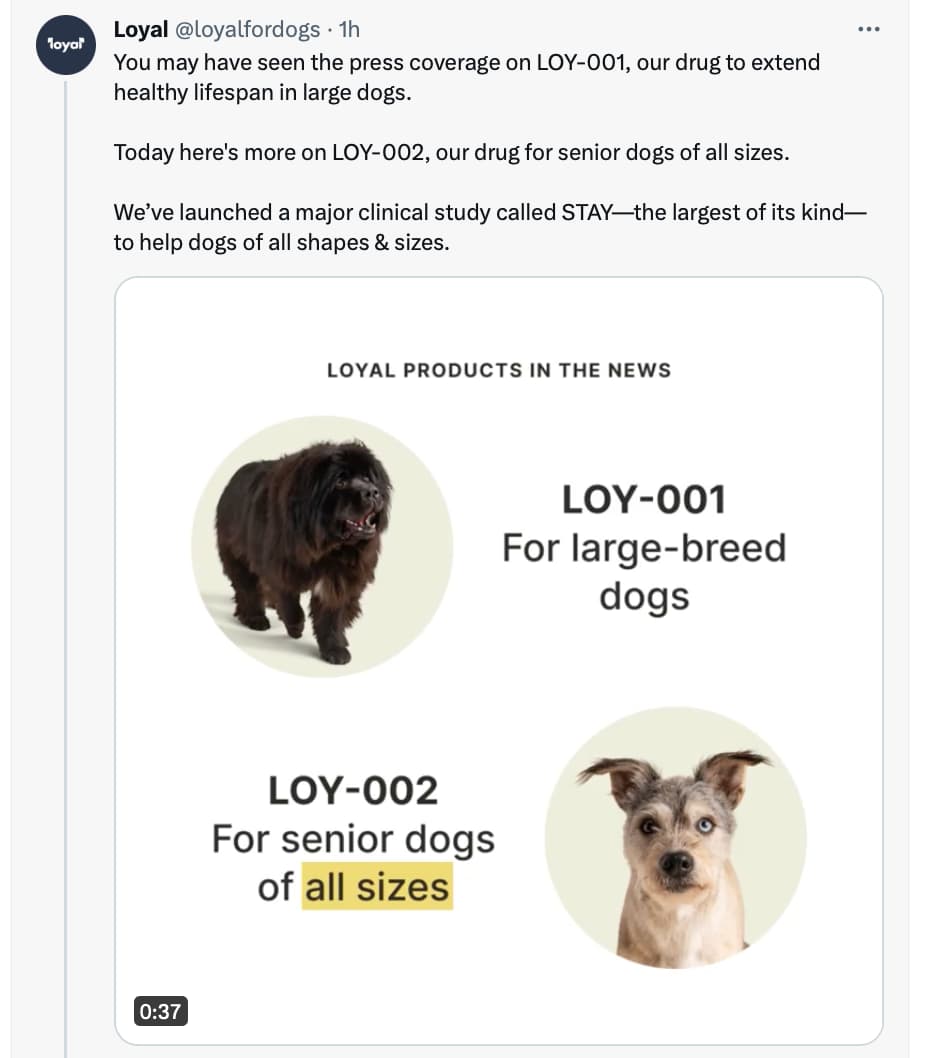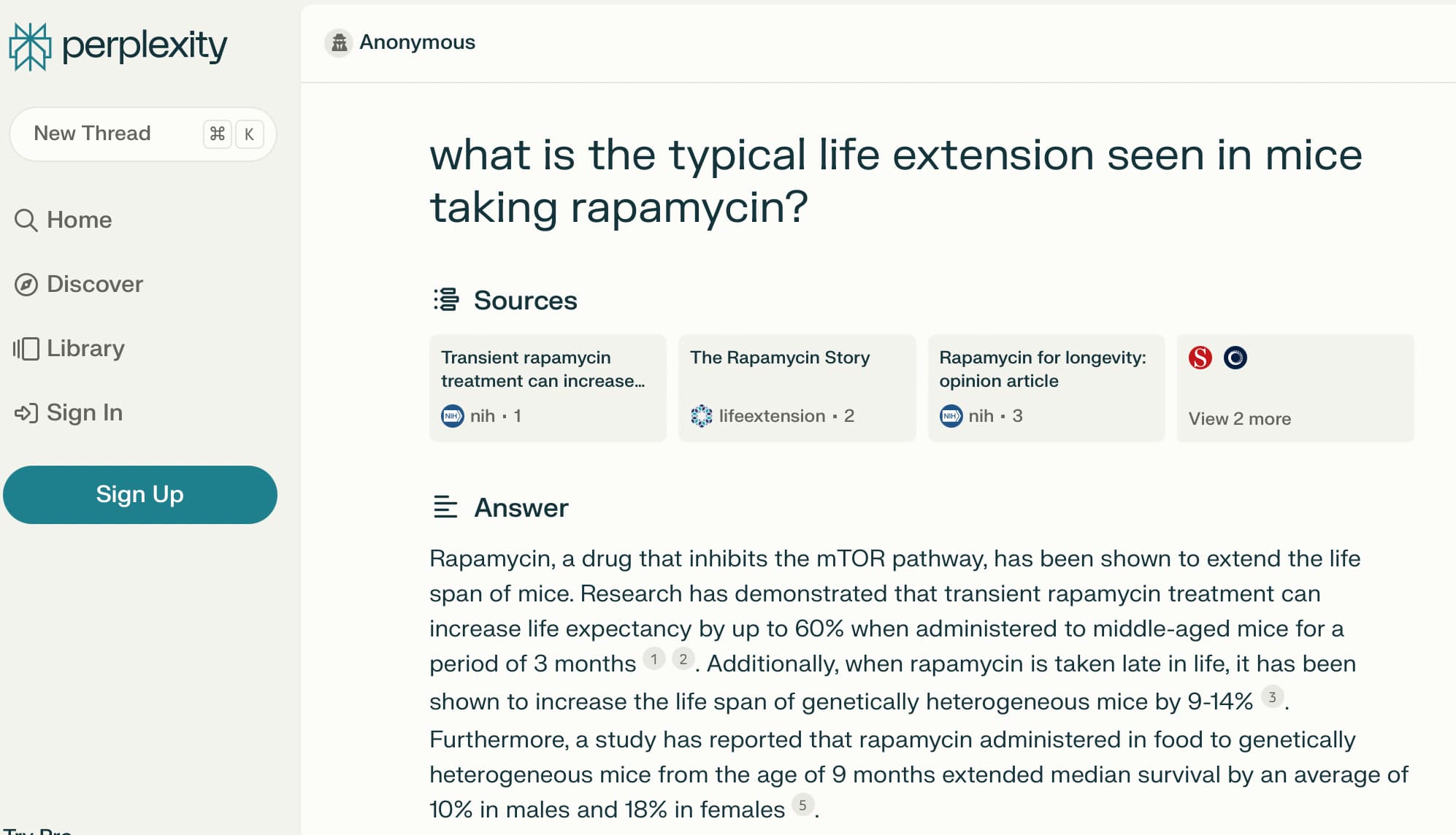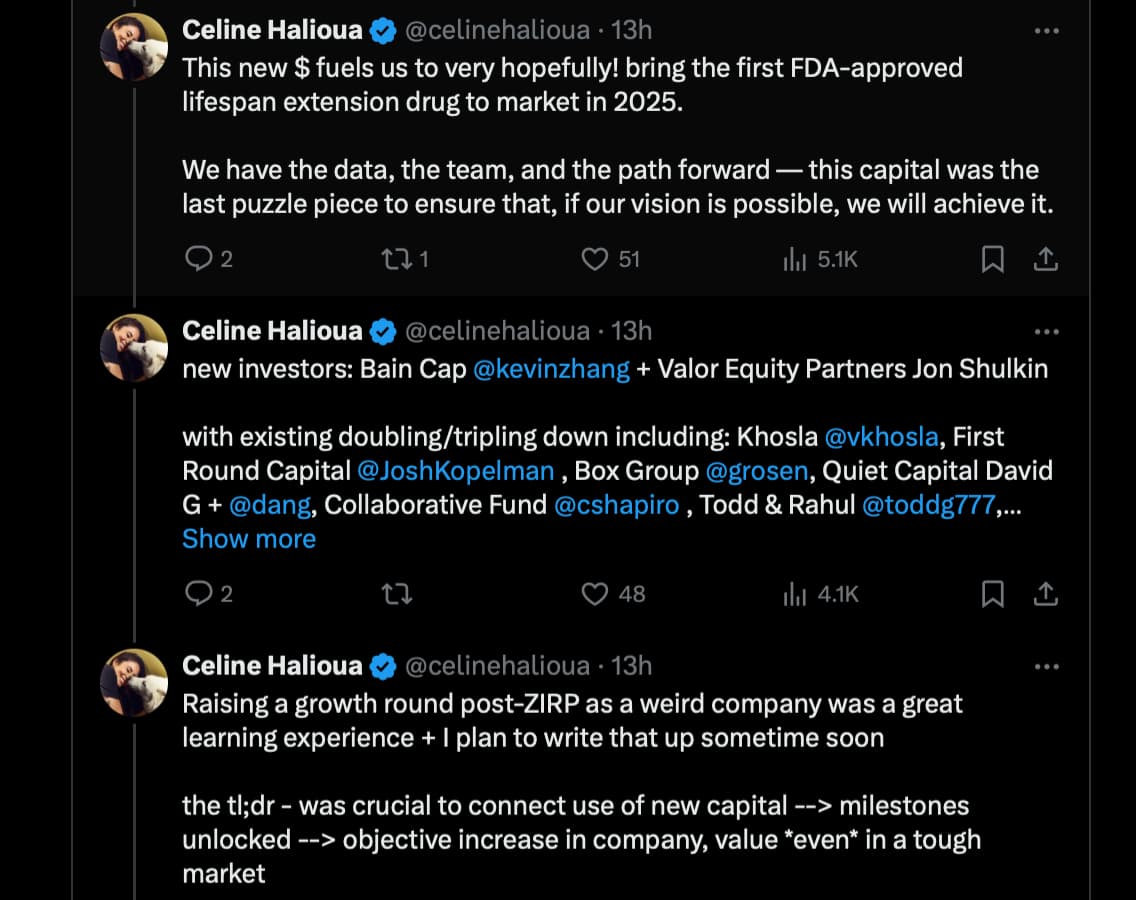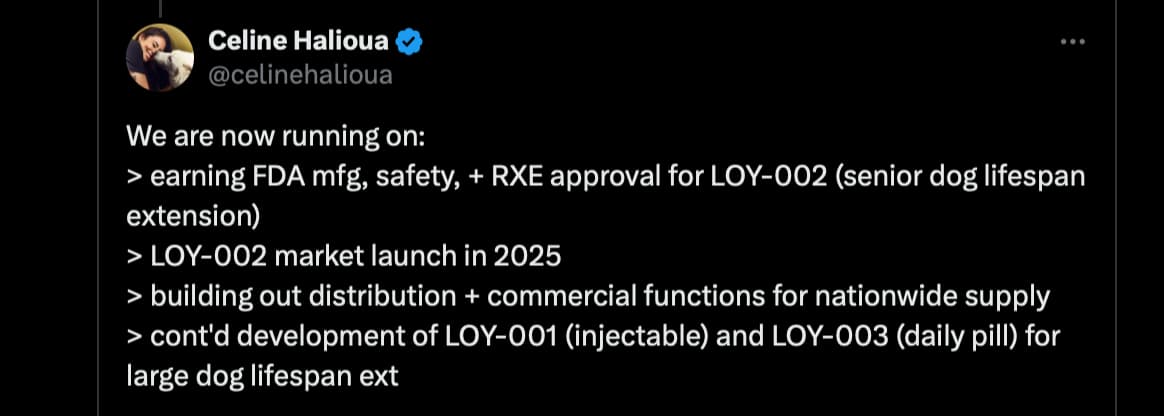Hi, Rapa Community! Sharing an interesting article.
Loyal, the company mentioned in the article, is based in San Francisco:
They have a good blog on their website, for anyone interested in dog longevity:
Thanks for the tip–I’ll check out their site and their blog.
Anybody know what their test products are?
No - they’ve been surprisingly quiet on their molecules and targets…
I’m sure at some point Celine will announce it and we’ll find out on her twitter feed:
This is the presentation Celine gave at the Longevity Conference last December, they’ve just put it online. Perhaps of interest to people:
I covered the presentation in this post: The Longevity Summit, News & Update - #9 by RapAdmin
They’ve started their second clinical trial for another dog longevity drug
Source: https://x.com/loyalfordogs/status/1753101875866726436?s=20
More info:
If there actually is a drug that works for dogs to improve their lifespan and it’s going mainstream I think it will feel like we will have reached a new level. It might be the ChatGPT moment of longevity and healthspan.
That is Celine’s goal. There is much less controversy (and general belief that its a good thing) around the idea of extending the lives of pets / dogs. Its definitely the wedge in the door that could open things up for the longevity biotech industry.
What lifespan improvement are they expecting? I’d say anything above 20% would feel very impressive to me.
That is a good question. I don’t actually know. If you look at the IGF-1 data on the Snell and Ames dwarf mice (very low levels of IGF1 and GH) they see upwards of 40% to 50% lifespan improvement. But that is lifelong inhibition of IGF1 and GH. In dogs, starting later in life, I would estimate maybe 5% to 10% but I’m not sure.
It also depends on how you measure it. Are you talking about increase in remaining lifespan, or increase in total lifespan. I suspect that Loyal will market whatever increase they get, as a percent of remaining lifespan (thus it will appear as a larger percent), so that could get them over the 20% that looks substantial and would lead headlines.
And it will vary obviously by when they start dosing the animals - in year 1, or year 3 of a large dog (with a 6 to 10 year lifespan typically?). I’m not sure what their recruitment criteria are: https://loyalfordogs.com/clinical-trials
Problem with that it will be like a balloon that fizzles out as some few prominent twitter profiles say the result isn’t as impressive as was marketed I think.
I do think 20% of total lifespan. So if a dog lived for 10 years they would live for 12 with this drug - then it would probably go viral I think. It’s fine I think if the result could be extrapolated, but I am just going by feeling. Meaning if a dog were expected to live 20% longer over total lifespan if started earlier, then it’s fine to market however.
I don’t know… I remember press covering this Kaeberlein/Bitto paper on a rapamycin study that used the “% of remaining life” as the measuring stick, and it didn’t get much pushback. I suspect the press, and most people, would just read the headline and get excited… and its not just the life extension, it will delay cancer (which is the key issue with many larger dogs).
Here we show that 3 months of rapamycin treatment is sufficient to increase life expectancy by up to 60% and improve measures of healthspan in middle-aged mice.
Even the AI search engines have picked up that one study, one of the rare ones that calculated lifespan increase based on the years of lifespan left, and puts it at the top of the heap:
See this link: https://www.perplexity.ai/search/what-is-the-7at.c4UrRdaJNRF4sn2urQ?s=u
Another $45 Million supporting dog lifespan work (and their initial drug for lowering IGF1 in dogs). Seems like a good vote of confidence on the longevity market, and the targeted pathways (IGF1, etc.).
Seems like a ton of money to bring out their own version of Somavert or Pegvisomant & Octreotide (IGF-1 inhibiting drugs already on the market, which I believe the Loyal drugs will likely be similar to).
Drugs that are already on the market that reduce growth hormone production (somatostatin analogues), all for people and very expensive.
- Octreotide / Octreotide LAR (Depot) , Sandostatin LAR
- Lanreotide (Somatuline) Depot
- Bynfezia (pen), octreotide acetate
- Signifor LAR (Pasireotide)
And there is a tablet-based one called Mycapssa from Amryt Pharma (but since its for humans, very expensive).
One way to look at Loyal is that they are a discount Pharma company, because it seems like their early drugs are all going to be similar to existing (expensive) human drugs, just cheaper (because major insurance companies aren’t paying for them). And I also assume dog health insurance companies won’t pay for the drugs. So, its all going to be direct payments by the dog owners.
I know all the formalities, FDA clinical trials, etc. take a ton of money, even for dogs. And they are following the path that other companies have already done in this IGF1 segment of the market taking what was an injection and making it into a tablet for better consumer acceptance.
The valuation of this round sounds reasonably good. The WSJ notes:
Loyal’s valuation increased, said founder and chief executive Celine Halioua, but she declined to comment on specific figures. Research firm PitchBook Data put the San Francisco startup’s valuation in its prior round in 2022 at $220 million.
We don’t know if thats pre or post-money valuation, but the trend looks good.
And, for people who are interested in the field, this type of funding progression and valuation should get people more interested in doing startup companies in the area.
Typically in tech/biotech startups of this type the CEO/Founder has approx. 10% to 15% of the stock, and so Celine’s share of the company could be worth over $20 million or $30 million + if they can implement well and get the drug to market and it has a reasonable reception by consumers.
Related: Another (likely) Longevity Drug - Somavert / Pegvisomant
Source: https://x.com/celinehalioua/status/1770835850928050686?s=20
Details here:
Dog Longevity Startup Loyal Secures $45 Million in Funding (Wall Street Journal)
And the Loyal Blog covering this announcement:
More coverage of longevity drugs (including rapamycin) in this new Bloomberg article (and Matt K. mentioned rapamycin news):
Your Dog Will Have an Anti-Aging Drug Before You Do
Clinical trials on humans could take decades — long enough for the study subjects to live out the rest of their lives. That’s where man’s best friend comes in.
Before we have an anti-aging drug for humans, we’re likely to have one for dogs. Multiple clinical trials are currently underway to test potential anti-aging compounds on dogs, since our best friends have become a popular animal model for human aging. Fido also represents a potentially huge market.
Full article: Your Dog Will Have an Anti-Aging Drug Before You Do (Bloomberg)
Have any of these been ITP studied? I don’t see them on the list of positive results.
No - they are all injections, and sadly ITP only does orally delivered compounds.
There is one oral version of octreotide called Mycapssa but its a recently released drug that is very expensive. Also - Loyal has a compound in testing with the ITP and I suspect it may be their take on an oral version of octreotide.





